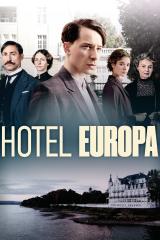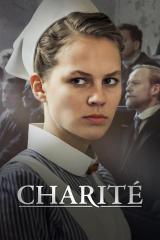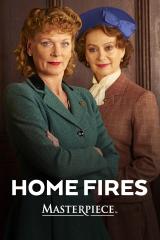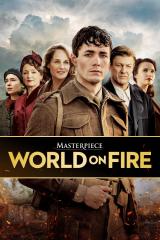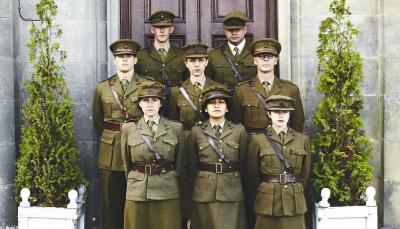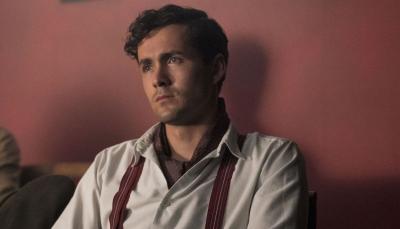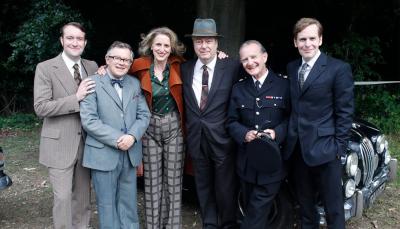What to Watch Now 'World on Fire' Season 2 is Finished
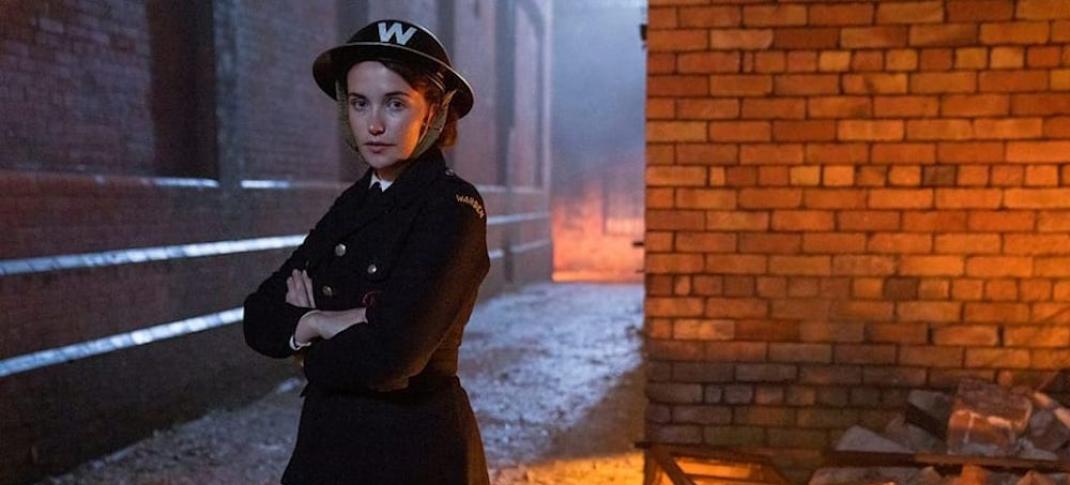
Lois (Julia Brown).
Credit: Courtesy of Courtesy of Mammoth Screen and MASTERPIECE
Warning: Some of the films suggested here contain graphic violence.
If you're hungry for more stories and information from the World on Fire series, look no further. From Polish resistance to British women's changing roles, and the role of soldiers from the British Empire, there is lots to explore, and there are aspects of wartime life that the series barely touched. If you thought Robina Chase was ripe for something to keep her busy and out of her son's business, she would almost certainly have been one of those bossy middle-class women who won the war.
By mid-1943, almost 90 per cent of single women and 80 per cent of married women were working in factories, on the land or in the armed forces. Over half a million women served in the Women's Royal Naval Service (WRNS), the Women's Auxiliary Air Force (WAAF) and the Auxiliary Territorial Service (ATS), and an additional 80,000 served in the Women's Land Army which provided agricultural labor to British farmers. Others flew unarmed aircraft, drove ambulances, as Lois did in Manchester, and served as nurses. Like many aspects of wartime life, serving the country was both a necessity and a success of propaganda. The British embraced wartime life and wartime hardships, although possibly with not as much enthusiasm for rationing as the Ministry of Food would have wished. In addition to volunteer work, women also had to take the time to queue to buy food and what wasn't rationed might not be available. Propaganda films, shown at the movies, encouraged families to grow their own vegetables, compost, keep healthy, dig for victory, salvage and recycle.
It's only recently that historians have acknowledged the role of the Indian Army, which fought so bravely for an Empire about which they had serious misgivings. By the end of the war 2.5 million men served in the Indian army, with divisions of infantry, armour and a fledgling airborne force. They fought on three continents against the Italian, German, Italian, and Japanese armies.
In World on Fire, Kasia has shown us how strong the pull of her home is, even though her parents are dead and the family home long gone. She is still determined to fight to save her homeland. We've seen Stan long for his family, seconds before his death, and Harry dutifully return home even though he is not made welcome there. We know that Europe is full of desperate, displaced persons, and that in future seasons of World on Fire we'll see more of them.
'Hotel Europa' ('Das Weiße Haus am Rhein')
World on Fire has tried twice now to tell the story of ordinary German citizens who are torn between self-preservation and resistance to a growing horror surrounding them, first in Season 1 with Nancy's neighbors and then in Season 2 with Marga's friends and family. On the heels of Season 2's finale comes the German miniseries Hotel Europa (originally Das Weiße Haus am Rhein), which is technically set just before the Second World War in Germany, but does a much better job of telling that story. We tend to forget that the build-up to the war began with the collapse of the Weimar Republic after the 1929 financial crash, and the creation of the Third Reich in 1933 when Hitler came to power, accompanied by a series of political and social changes. It's difficult to see history when you're living it.
Told from the perspective of Emil Dreesen (Jonathan Berlin), the Walter Presents series is based on the real-life family of Jewish hoteliers thriving in the interwar Weimar Republic, with rich and famous guests including a young Konrad Adenauer, Gustav Gründgens, and Charlie Chaplin... until an ambitious Adolf Hitler and his National Socialists choose the noble house as one of their preferred spots in the German Reich. Emil's horror at some of his family's willingness to go along with the new clientele is only the beginning of a house divided as conflict within the Dreesen family escalates. Both seasons stream on PBS Passport starting Friday, December 8, 2023.
'Defiance'
The Polish resistance features strongly in World on Fire, and the 2008 movie Defiance, written by Clayton Frohman and directed by Edward Zwick (Glory), is based on the true story of the Bielski brothers' resistance in Byelorussia (now Belarus). Set in 1941, when whole villages were destroyed and their Jewish inhabitants massacred, three brothers, Tuvia (Daniel Craig), Zus (Liev Schreiber), and Asael (Jamie Bell), narrowly escaped the same fate. With Tuvia leading, they set up a partisan camp in the dense forests and were able to save over 1,000 Jewish people from deportation. They even broke into the Polish Ghetto and persuaded some of its inhabitants to escape.
In this scene, the marriage of Asael and Chaya (Mia Wasikowska) is shown in parallel with Zus leading an ambush on a German convoy. It's a bit Godfather-esque but brilliantly done in a movie full of startling visual effects (Craig on a white horse!) and some terrific, impassioned acting. Defiance is on the Roku Channel and available as a streaming rental.
'Doing Her Bit in Churchill's Secret Army'
But what about female spies? Let's go back to the source, an interview with writer and former spy Noreen Riols who was awarded the MBE for her wartime service eighty years after being called up. She was recruited to Winston Churchill's training facility for his secret agents on the strength of her fluent French. She originally intended to join the WRNS (Women's Royal Naval Service, known as the Wrens) because she liked the hats. (Well, she was eighteen.) In 2013, she broke her silence with the publication of her book The Secret Ministry of Ag. & Fish: My Life in Churchill’s School for Spies.
It’s a life of fear, of tension, of betrayal and that dread of the hammering on the door in the middle of the night or that tap on the shoulder with the gun pointing into your back. You know the game is up and all that remains is being tortured, the concentration camp and the possibility of execution in the most barbaric manner.
She attended the remote Scottish location where modern-day volunteers underwent rigorous and authentic training (although with modern safety belts when appropriate), in the Netflix series Churchill's Secret Agents: The New Recruits.
'Madame K' ('Litsid')
World on Fire's secret strength is in telling under-told stories about World War II, usually by focusing on those who are ignored by the mainstream: women, LGBTQ, those with mental illnesses like PTSD, and the soldiers from the colonial nations. It also tries to include theaters of war people don't think about, and Madame K is exactly that sort of series. It's a miniseries from Estonia, a country most people don't think about when they hear "World War II," a Walter Presents series chosen due to the number of awards it garnered in its home country.
The original title, Litsid, literally translates as The Whores, (or a word that rhymes with "The Witches"), but for English audiences, it renamed the series after the show's lead, Mrs. Kukk (Merle Palmiste), aka Madame K. The 1940s period piece is set in Estonia's capital, Tallinn, and recounts WWII through the eyes of the people working at and frequenting Madame K's elite brothel, another sort of war work for women, as the country declares neutrality only to be repeatedly invaded and occupied, first by Stalin, then by Nazis, before ultimately being annexed into the USSR.
'Spies of Warsaw'
The BBC series Spies of Warsaw stars David Tennant as French military attaché Colonel Jean-François Mercier, an aristocratic spy tasked with finding out exactly what Germany's political intentions were in the years leading up to the Second World War. Posing as an official in the French Embassy in Prague, he attends official events while running a spy ring but has trouble convincing his superior officers that things are looking very bad indeed for Warsaw and Europe.
Written by the comedy duo of Dick Clement and Ian La Frenais (responsible for such British classics as Porridge and The Likely Lads) and based on the novel by Alan Furst, the series was criticized for its pacing despite the presence of Tennant, and other accomplished cast members, including Janet Montgomery (New Amsterdam) as his love interest, Marcin Dorocinski (Queen's Gambit) as Polish officer Antoni Pakulski, plus Anton Lesser and Fenella Woolgar. The series is available on Amazon Prime Video.
'Charité'
Originally streamed on Netflix until the service let the rights go, Charité is one of Walter Presents' (and PBS Passport's) biggest gets. Season 1 of the French series was set in 1888 when the titular hospital first opened; it was one part period drama, one part hospital soap opera, and addictive viewing. However, Season 2 turned the show into an anthology series, jumping ahead to the 1940s and World War II. (Netflix had it under the title Charité At War).
For those who wanted more of the story started under Dr. Webster in World on Fire Season 1 and continued with Henriette in Season 2, this is the show to watch. The hospital finds itself trying to hold down the homefront during the Blitz while overwhelmed with injured soldiers sent home from the front, only to discover that their hopes are dashed when the country surrenders rather than fight.
'The Night Watch'
Based on Sarah Waters' 2006 novel of the same name, The Night Watch is a 2011 BBC movie currently airing on BritBox. It shows us the lives of LGBTQ+ people during the Blitz marginalized by their sexuality. The film opens in 1947 when the characters look back upon their wartime experiences, which for Kay Langrish (Anna Maxwell Martin) was as an ambulance driver, a job held by Lois in World on Fire. Going back to 1941, relationships change and fluctuate against the violence and destruction of the Blitz.
The cast also includes Claire Foy (The Crown), Anna Wilson-Jones (Victoria), and Jodie Whittaker (Doctor Who), and an early role for Phoebe Waller-Bridge (Fleabag). In this clip, Duncan (Harry Treadaway), shamed by his sexual orientation and imprisoned, is sought out by a former cellmate, Robert (JJ Feild), a conscientious objector. The stories of conscientious objectors in World War II are mostly lost or forgotten –– Britain's Imperial War Museum has not kept its records.
'Home Fires'
Directed by Robert Quinn and written by Simon Block (The Windermere Children), Home Fires gained a tremendous following in its two seasons from 2015 to 2016. Set in a rural English town, it focuses on the members of the Women's Institute led by Frances Barden (Samantha Bond) and Joyce Cameron (Francesca Annis), who vote to devote the organization's work to the war effort.
All of the women in the community are involved, and new demands made on them by war work do not make current problems magically disappear –– a woman married to an abusive husband, a mother who will do almost anything to stop her son from going to war (ignoring the fact that he wants to sign up), a schoolteacher who hides a secret that could destroy her career. Friendships are formed across class lines, and like many women of their time, they are able to learn and master new skills. Home Fires is a heartwarming and engaging series.
'Hope and Glory'
Written and directed by John Boorman (Deliverance), Hope and Glory was written after he returned to England, leaving his job as a Hollywood producer. The result was this funny, touching, ribald account of his experiences growing up in a London suburb during World War II. War, for an adventurous young boy, Billy (Sebastian Rice-Edwards), is both terrifying and entertaining. Bombs may fall, but they leave shrapnel behind as trophies, and there are limitless possibilities for destructive fun in the ruins of bombed-out houses.
The world of adults –– mostly women, since the men are away –– is tolerated. At school, the children recite their times-table while wearing gas masks and taking shelter in the basement, and are reminded that the pink bits on the world map represent the British Empire, for which this war is being fought. Boorman went on to create a sequel, Queen and Country (2014), in which Billy's army experiences as a soldier are chronicled, and also starring Rice-Edwards. The film is streaming free on Tubi.
'Casablanca'
1942's Casablanca was just one of the offerings in production on the well-oiled Warner Brothers movie-making machine when it was released, with no thought that it ever might be destined to still be a hit some eight decades later. It was business as usual, based on the script of an obscure three-act play, and originally set to star Ronald Reagan and Ann Sheridan. (Thank goodness that changed.) At eighty years it remains an impressive piece of film-making, with not a wrong note in it.
The chemistry between Rick (Humphrey Bogart) and Ilsa (Ingrid Berman) is off the charts, and so is the chemistry between Bogart and Chief of Police Captain Louis Renault (Claude Rains). The terrified and exploited refugees in the town of Casablanca see America as their only hope, having left everything behind. For many Americans of his generation, Rick's transformation from isolationist to fighter was inspirational, a triumph of propaganda. Casablanca significantly cast many real-life Jewish refugees in supporting roles. It is a pitch-perfect miracle of camera work, design, setting, characterization, and enormously relevant to what was going on in the world. Casablanca is streaming on Max.

